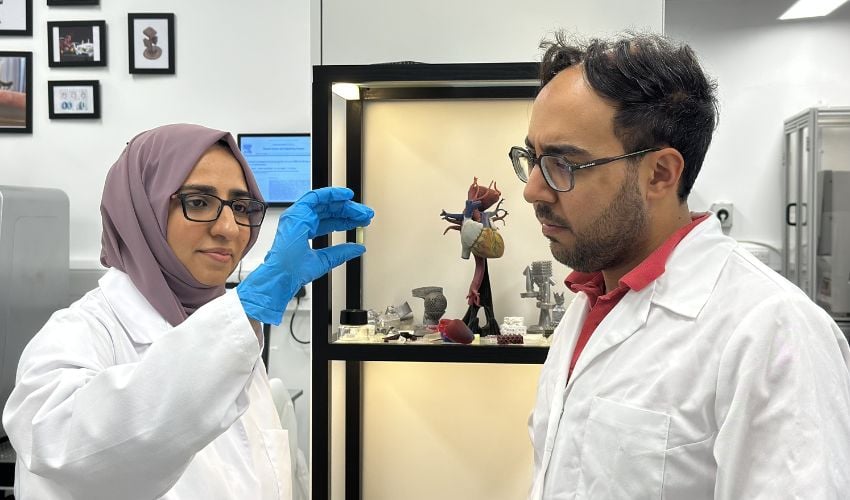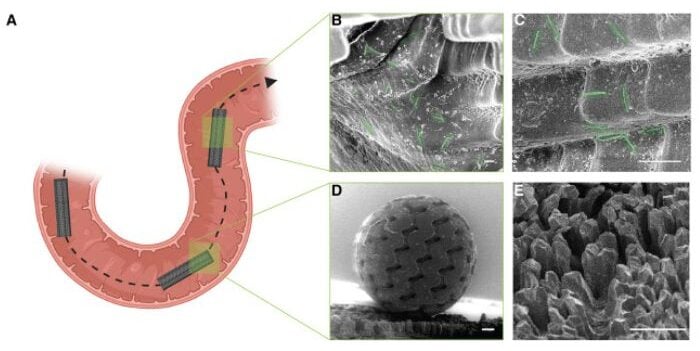CORAL: A 3D Printed Ingestible Capsule to Sample Your Gut Microbiome

The gut microbiome is a complex ecosystem of bacteria, viruses, fungi and parasites that resides in the intestines. Shaped by both diet and environment, each person’s microbiome is unique. This ecosystem interacts with the digestive, immune, nervous and endocrine systems, though many of these relationships remain only partially understood. To advance research in this area, a team from NYU Abu Dhabi has developed a 3D printed capsule known as CORAL (Cellularly Organized Repeating Lattice), designed to collect microbial samples from the small intestine as it travels through the digestive tract. This new tool aims to help researchers better understand how the gut microbiome influences overall health.
The NYU Abu Dhabi team wants to explore the small intestine’s microbiome because traditionally, gut microbiome studies have relied on fecal samples, which primarily represent microbes from the large intestine. This leaves the small intestine largely unexplored, despite it being the site of many crucial interactions between the body and microbes. The study’s co-author Hanan Mohammed explained, “The bacterial communities in the gut profoundly influence immunity, metabolism, aging, and overall health. CORAL’s potential lies in enabling earlier disease detection, tracking how therapies are working, and ultimately developing new microbiome-based treatments that restore balance where it’s lost.”

Conceptual design of the CORAL capsule for microbial sampling in the small intestine (left) and design and fabrication of CORAL capsules (right)
CORAL: Inspired by Marine Corals
The creators of the CORAL capsule took their inspiration from marine life. Made from inert resin, the capsule has a texture like marine corals, which support diverse microbial life thanks to their porous structure. These pores increase its surface area, allowing it to passively capture microbes. The research team therefore created a geometric triply periodic minimal surface (TPMS) pattern, designed to trap bacteria, for CORAL. 3D printing was critical to achieving the design. The study notes: “Fabricating microscale TPMS-based structures is a challenge. However, recent advancements in additive manufacturing (3D printing) have enabled the production of intricate, self-supporting TPMS architectures at nanoscale resolutions.”
CORAL was made of three components: an external shell, an internal core and a cap that secures the core before retrieval. The purpose of the multiple-part design is to isolate the sampled small intestinal contents from the subsequent areas of the gastrointestinal tract. Remarkably, the capsule was created in a single additive manufacturing step. They fabricated CORAL (diameter of 2.1 mm and length of 8.2 mm including cap) using projection micro stereolithography (PμSL), with a machine from Boston MicroFab. Because manufacturing takes place in a single step, it saves time and expense. That makes this passive sampling method attractive to scale for larger studies or clinical use.

Schematic showing CORAL core capsule passing through an ex vivo section of small intestinal tissue (left) and SEM images of the capsule capturing bacteria (right)
Once swallowed, CORAL collects microbial samples while moving naturally through the body, until it is excreted with the stool. Then, researchers can retrieve and analyze the capsule. The NYU Abu Dhabi team tested CORAL on isolated animal tissues and in live rats. They reported that in all tests, the capsule passed safely through the body. Follow-up genetic analysis revealed that CORAL collected microbial communities that are usually missed in standard fecal samples, including Streptococcus, Enterococcus and Curtobacterium.
The simple design of CORAL was meant to minimize failure points, creating a functionality that increases its utility. The team plans to start trials on patients soon. “We see CORAL as a transformative tool for unlocking parts of the gut that have long been inaccessible. In research, it will allow scientists to study microbial communities in the small intestine with unprecedented detail. Clinically, we envision it supporting non-invasive diagnostics and personalized treatment strategies for gut-related conditions,” concluded co-author Aashish Jha. To learn more about the research, read the study HERE.
What do you think of the 3D printed capsule? Let us know in a comment below or on our LinkedIn or Facebook pages! Plus, don’t forget to sign up for our free weekly Newsletter to get the latest 3D printing news straight to your inbox. You can also find all our videos on our YouTube channel. Interested in more medical and dental 3D printing news? Visit our dedicated page HERE.
*Cover Photo: Hanan Mohammed and Khalil B. Ramadi look at CORAL. All Photo Credits: Hanan Mohammed et al.







